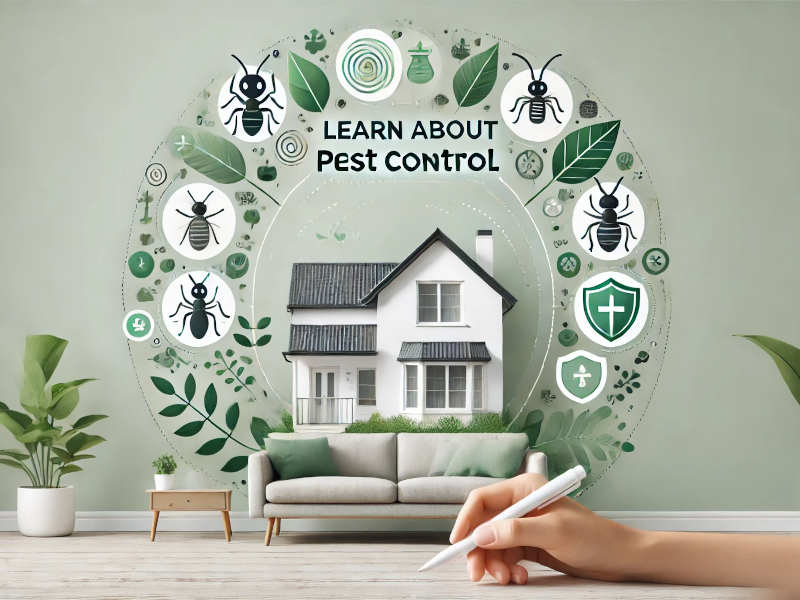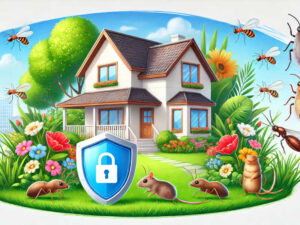Where to Learn More About Pest Control Services and Treatment Options

7 minute read time
Pest control doesn’t have to be overwhelming. With so many resources available, it’s easy to learn about pest management and treatment options. Start by exploring local pest control companies, government websites, and educational blogs. Dive into books, eBooks, and online tutorials for in-depth knowledge. Use social media and online communities to share experiences and gain practical tips.
Consider DIY pest control stores and professional training if you want hands-on or expert-level insights. Don’t forget video tutorials for step-by-step guidance and newsletters to stay updated. By understanding the range of treatment options—chemical, biological, mechanical, and integrated methods—you’ll be well-prepared to manage any pest problem effectively.
Pest control is essential for keeping homes and businesses safe and comfortable. Whether dealing with ants in the kitchen, bedbugs in the bedroom, or rodents in the basement, finding effective solutions is a top priority. Understanding pest control services and treatment options can save you time, money, and frustration. Let’s explore where you can find reliable information about pest management, understand treatment methods, and identify trustworthy resources. By tapping into these resources, you can protect your home and health while staying proactive and confident about pest control. Read on for more in-depth details…
Start with Local Pest Control Companies
Local pest control companies are excellent sources of information. Most businesses have websites that outline their services, the pests they target, and the treatment methods they use. Many offer blogs, FAQs, and guides to educate customers. A simple Google search for pest control companies in your area can connect you with nearby experts.
For example, suppose you’re looking for eco-friendly pest control options. In that case, many companies now highlight sustainable methods, such as using biological controls or integrated pest management (IPM) techniques. Reviewing local businesses online also allows you to check reviews and testimonials to gauge their reliability.
Government and Public Health Resources
Government websites often have detailed guides on pest prevention and management. Agencies such as the Environmental Protection Agency (EPA) or Centers for Disease Control and Prevention (CDC) in the United States provide insights into safe pesticide use and tips for preventing pest infestations. Local public health departments also offer valuable resources tailored to specific regions and climates.
These websites are particularly helpful for learning about the risks pests pose to health, such as the diseases spread by mosquitoes or ticks. They also provide advice on how to handle pest problems safely without putting your family, pets, or the environment at risk.
Educational Websites and Blogs
Many educational websites and pest control blogs specialize in providing straightforward advice. These platforms often share step-by-step guides on pest identification, prevention, and treatment. Websites such as PestWorld.org, managed by the National Pest Management Association (NPMA), are rich with information about common household pests and treatment strategies.
When using blogs, it’s wise to stick to those run by reputable organizations or experienced professionals. Independent bloggers may offer good tips, but their advice might not always align with best practices or safety guidelines. Look for well-sourced articles that provide clear, actionable advice.
Social Media and Online Communities
Social media platforms, forums, and community groups can be surprising sources of pest control knowledge. Sites like Reddit have dedicated threads for home improvement and pest control topics. Facebook groups often include local community forums where members share experiences and recommend pest control professionals.
While these spaces can provide practical advice, approach them with caution. Not all recommendations or tips are scientifically sound. Verify any advice you receive by cross-referencing it with information from trusted sources.
Books and eBooks
Books remain a fantastic way to dive deeper into pest control. Libraries and online retailers carry guides that detail pest identification, treatment methods, and preventive measures. Some titles focus on specific pests, such as termites or bedbugs, while others cover general household pest control.
eBooks and audio-books are especially convenient for those who prefer learning on the go. Many pest control professionals have written guides that are easy to understand and implement. Ensure the author has credible qualifications or extensive experience in the pest management industry.
DIY Pest Control Websites and Stores
For homeowners who prefer a hands-on approach, DIY pest control websites and stores are valuable. These platforms sell pest control products and often include video tutorials or written guides. Examples include how to use bait traps for rodents or sprays for insects.
Remember, safety is crucial with DIY methods. Always follow the product instructions and safety precautions to protect yourself, your family, and the environment.
Professional Training and Certification Bodies
If you want expert-level knowledge, professional pest control training organizations can help. Institutions that certify pest control professionals offer comprehensive courses on pest biology, treatment techniques, and safety standards.
While this level of detail might not be necessary for the average homeowner, these resources are helpful if you’re considering a career in pest management or simply want an in-depth understanding of how professionals handle pests.
YouTube Channels and Video Tutorials
Video content offers visual learners an accessible way to understand pest control. YouTube is filled with channels dedicated to home improvement and pest control. Videos often demonstrate techniques step by step, making it easier to follow along.
Look for videos from pest control companies or certified professionals to ensure you’re getting accurate and safe advice. Channels with large followings and good reviews are often reliable.
Ask the Experts: Consultations and Inspections
Sometimes, the best way to learn is through direct consultation. Many pest control companies offer free inspections or consultations. This allows you to ask questions about the pests in your home and learn about treatment options.
If a consultation isn’t free, it’s still worth the investment. You’ll gain professional insights tailored to your specific situation. This personalized advice can help you avoid wasting money on ineffective treatments.
Stay Updated with Newsletters and Subscriptions
Many pest control companies and educational platforms offer newsletters. Subscribing to these can keep you informed about seasonal pest threats, new treatment options, and prevention tips.
For instance, newsletters might alert you to termite swarming season or explain how to prepare your home against winter pests. Staying updated ensures you’re proactive rather than reactive about pest management.
Understanding Treatment Options
Knowing where to learn about pest control is important, but understanding treatment options is equally crucial. Here’s a quick overview of some common methods:
- Chemical Treatments: Involves pesticides to eliminate pests. It’s effective but must be handled carefully to avoid harm to humans and pets.
- Biological Controls: Uses natural predators or pathogens to manage pests. For example, introducing ladybugs to control aphids.
- Mechanical Controls: Includes traps, barriers, and other physical methods to prevent pests from entering your home.
- Integrated Pest Management (IPM): A combination of techniques that focus on long-term prevention and minimal environmental impact.
Each treatment method has its pros and cons. The best option often depends on the type of pest, the severity of the infestation, and your personal preferences regarding safety and sustainability.
The Importance of Continuous Learning
Pest management is not a one-time effort. Pests adapt to changes in their environment, and new treatment methods are continually being developed. By staying informed, you’ll always be ready to handle pest challenges effectively.
Learning about pest control services and treatment options ensures you can make informed decisions, whether hiring a professional or tackling the problem yourself.







